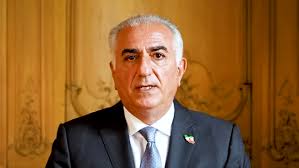‘Islamic Republic has reached its end…Khamenei gone into hiding’: Reza Pahlavi, son of last Shah of Iran

In a powerful statement that could further fuel tensions inside Iran, Reza Pahlavi, the exiled son of the late Shah Mohammad Reza Pahlavi, has declared that the Islamic Republic has reached its final days. Speaking to international media and through social platforms, Pahlavi claimed that Iran’s Supreme Leader, Ayatollah Ali Khamenei, has “gone into hiding” amid increasing civil unrest and internal instability.
A Country at Boiling Point
Iran has been grappling with months of growing protests and public dissatisfaction fueled by economic hardship, government crackdowns, and deepening distrust of the ruling clerical establishment. The death of Mahsa Amini in 2022 triggered a wave of demonstrations, many of which continue to echo across the nation. In recent weeks, labor strikes, university protests, and viral acts of civil disobedience have returned to Iranian cities.
According to Pahlavi, this growing momentum is pushing the Islamic Republic toward collapse. “The regime has lost all legitimacy in the eyes of the Iranian people,” he stated. “We are witnessing the final chapter.”
Khamenei’s Whereabouts Questioned
While Iranian state media has portrayed business as usual, Pahlavi has made striking allegations about Khamenei’s absence from the public eye. “He has gone into hiding,” Pahlavi claimed, without providing verifiable evidence. The last confirmed public appearance of Khamenei was weeks ago, raising questions among observers.
Though Iranian officials have not commented on the matter, analysts suggest that Khamenei’s retreat from public view may be a security precaution or health-related. Nonetheless, Pahlavi’s remarks have reignited debate about the state of leadership within Iran’s theocratic system.
A Renewed Push for Regime Change
Reza Pahlavi, who lives in exile and has long advocated for a secular and democratic Iran, has gained increased visibility in recent years. With growing support among some Iranian diaspora communities and younger generations disillusioned with the current regime, his voice carries symbolic weight.
“Now is the time to unite and build a free Iran,” he said in his statement, urging Iranians at home and abroad to continue resisting the clerical regime through nonviolent means.
While his critics accuse him of trying to reclaim monarchical glory, supporters argue that his role is more about transitional leadership and helping Iranians reclaim their freedom, rather than restoring the monarchy.
International Reactions
So far, there has been no official reaction from Western governments regarding Pahlavi’s remarks. However, international observers note that if unrest continues and leadership fractures become more visible, the geopolitical dynamics surrounding Iran could shift.
With ongoing sanctions, nuclear negotiations stalled, and internal pressure mounting, Tehran faces one of its most volatile periods in decades.
Outlook: A Nation at a Crossroads
Whether Pahlavi’s claims about Khamenei’s whereabouts hold water or not, one thing is clear: Iran is standing at a historical juncture. As protests grow louder and opposition voices bolder, the future of the Islamic Republic is being called into question more urgently than ever before.






